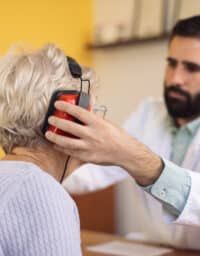Should You Join a Hearing Loss Support Group

Living with hearing loss can sometimes feel isolating despite being common. One in eight people aged 12 or older have hearing loss in one or both ears, according to standard hearing examinations. You could be wondering how to navigate living with hearing loss, and a support group is a great option. If you suspect you may have…
These Four Habits May Be Harming Your Hearing Health

Hearing loss is one of the most common chronic conditions. Statistics show us that approximately 15% of American adults report some trouble hearing. Some causes of hearing loss, such as age or genetics, are out of your control. However, you may also be engaging in some habits that are harmful to your hearing health. Regular…
Is There a Link Between Tinnitus and Blood Pressure Medication?

Tinnitus is a ringing, buzzing or clicking noise in the ears that cannot be heard from the outside. Tinnitus is relatively common, with approximately 15% to 20% of people affected. Though tinnitus is frequently caused by damage to the ears from loud noise, hearing loss, ear injury or problems with the circulatory system, a lesser-known…
How To Avoid Hearing Loss While Riding Motorcycles

If you love riding motorcycles, you know how important it is to protect yourself. It’s why you make sure you pick up gear like helmets and gloves when you’re at Houston Motorcycle Exchange. However, while everyone knows about the importance of protecting your body in the event of a crash, what’s less talked about is…
Ways Seniors Can Protect Their Hearing

Aging is a leading cause of hearing loss. The National Institutes of Health states that age-related hearing loss, also known as presbycusis, “develops and is exacerbated by various factors, including heredity, medical disease and environmental factors.” While some of these factors are out of your control, if you are an older adult, there are steps…
How to Prepare for a Hearing Test

If you’re considering scheduling a hearing test or already have, congratulations! You’re one step closer to better hearing and communication. Fortunately, there are several things you can do to feel prepared for your hearing test. We review a list of ways to prepare below. Review Your Medical History At the start of your hearing test,…
How Severe Is Your Hearing Loss?

According to a cross-sectional analysis of data collected between 2001 and 2010, “An estimated 25.4 million, 10.7 million, 1.8 million, and 0.4 million US residents aged 12 years or older, respectively, have mild, moderate, severe, and profound better-ear hearing loss.” If you suspect you have hearing loss, you may be wondering how it would be…
What Is TMJ-Related Hearing Loss?

Temporomandibular joint (TMJ) disorder refers to dysfunction of the hinge that connects your lower jaw to your temporal bone. Because this joint is located so close to the ears, TMJ disorder can sometimes affect their function, too. We review the connection below. Symptoms of TMJ-Related Hearing Loss Some of the more common symptoms of TMJ…
Protect Your Hearing This Audiology Awareness Month

Exposure to loud noise is one of the most common causes of hearing loss. Since October is Audiology Awareness Month, we thought it was the perfect time to talk about how to protect your hearing. How Noise Can Cause Hearing Loss Prolonged exposure to any noise over 85 decibels can lead to noise-induced hearing loss…
How To Make the Most of Virtual Meetings When You Have Hearing Loss

If you’re like millions of other Americans who have transitioned to either working full-time or part-time from home, you’ve certainly experienced an increase in virtual meetings. If you have hearing loss, this may present some unique challenges. The good news is that there are many ways to make it easier to hear and participate in…
